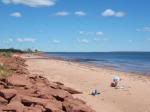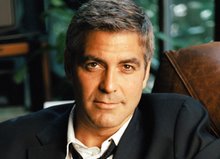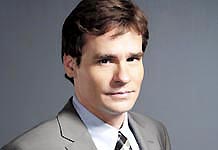As one of the
RIP perils,
Carl has suggested reading a short story of a spooky nature on the weekend and posting about it. At the same time,
john mutford has been posting
Short Story Monday. I have always enjoyed short stories. Serendipity, no? It does seem to be calling out to me to read and post about some short stories. As I looked at my pile of books, and my RIP list, I seem a little short story heavy as it is.
Among the Shadows by LM Montgomery, and
Fragile Things by Neil Gaiman are both on my list. I have
Everything's Eventual by Stephen King on my alternate list. [I've been carrying this book around since last year, when my sister picked it up in the library on the Grand Princess of our Mediteranean cruise. How great an image is that? A library, with a shelf of take 'em/leave 'em books, to read on the deck, under the Mediterranean sun, with Angelo bringing another strawberry daqueri, with no children?] I didn't get to read the King book last year, so RIP seemed appropriate. And if I read one story a week, this should last me the two months of reading in peril. That's my plan, then: one Stephen King a week, and my thoughts.
Now my Stephen King background: I love him. I mean his writing. I was in a huge King phase, reading most everything I could get my hands on, during the eighties.
The Stand - read it in nearly one sitting, and if you know that book, you know the bedsores I had,
It,
Needful Things,
Different Seasons, I mean he has written some of my absolute favorite books. He is so readable. But I went off King, for some reason. Sometime around
The Dark Tower series, I lost the thread of his books; they just didn't scream to me or make me scream anymore. So here I am, with the book, and the challenge, and the blog, all coming together in a Short Story Monday. I just started the Introduction and was right back in King fangirl status. Even his intros are good. "
Yet for me, there are few pleasures so excellent as sitting in my favorite chair on a cold night with a hot cup of tea, listening to the wind outside and reading a good short story which I can complete in a single sitting." Amen, Mr King, amen.
Autopsy Room FourWith the first story, King leads, 1 -0 in scaring the bejeesus out of me. I was on the edge of my seat for the whole 30 pages. First, I'll have to tell a little story about me. Once, in my single, university dorm room, I had an experience. My brain woke up, but my body did not. I could think, but not move. I tried to move, nothing. I tried to talk, scream, twitch; nothing. I was a little panicked, but couldn't do anything. In a move which characterizes me very well, I gave up and went back to sleep. In the morning, I woke up like usual. Anybody I mentioned this to, dismissed it as a dream, but I know it wasn't. I'm sure I even read somewhere, sometime, that this is a syndrome, or sleep event.
King takes an event, based on an old Hitchcock show, that people would fear: being alive and being mistaken for dead, with no way to let anybody know. Thus our narrator describes, slow step by slow step, his experience in the title. Part of the fear is knowing that
Stephen King is writing, and how far will he take you? Does he have
any boundaries? He builds and builds the suspence. Is our narrator really alive? Is this really what death is like? Could this really happen?
The characters seem real, and included are his characteristic popular references. For example, the Stones are playing in the background and their songs become a part of the story. King takes advantage of the fact that our imagination is even worse than anything he can come up with, and the genius of his writing is waiting for the story to end, to see how he can possibly finish this other than the ending you have imagined. This one ended a little quickly and corny, but the build up was worth it.
How will I ever wait until next week for King's next short story?

 I'm very new to the vampire genre, and I was worried before I started. I've read so many raves about this book (the first in a trilogy) and I'm not sure I 'get' vampires or their attraction. I never watched Buffy the Vampire Slayer and I haven't read Twilight by Stephanie Myers. This book sucked me in though. (sorry about that pun)
I'm very new to the vampire genre, and I was worried before I started. I've read so many raves about this book (the first in a trilogy) and I'm not sure I 'get' vampires or their attraction. I never watched Buffy the Vampire Slayer and I haven't read Twilight by Stephanie Myers. This book sucked me in though. (sorry about that pun) This makes the fourth book book I've finished for the RIP II challenge. I still have Fragile Things by Neil Gaiman to read, which is an extra peril, and I'm still working on The Small Peril, short stories from Stephen King's Everything's Eventual. I have quite enjoyed all my books so far. If you want to see all the reviews, check out the RIP yarns review site.
This makes the fourth book book I've finished for the RIP II challenge. I still have Fragile Things by Neil Gaiman to read, which is an extra peril, and I'm still working on The Small Peril, short stories from Stephen King's Everything's Eventual. I have quite enjoyed all my books so far. If you want to see all the reviews, check out the RIP yarns review site.




























